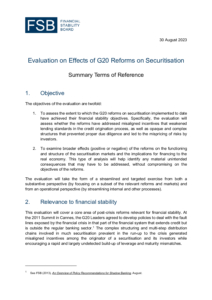A number of regulatory reforms were introduced in the aftermath of the 2008 global financial crisis to address the information asymmetries and incentive problems associated with securitisation markets. The reforms included increases in required capital in relation to banks’ securitisation-related exposures; improving disclosures and facilitating standardisation; and addressing incentive problems through retention requirements and by enhancing the rating process.
Implementation of the securitisation reforms is advanced and has progressed to a stage where an evaluation of their effects is feasible. The FSB evaluation will assess the extent to which the G20 reforms on securitisation implemented to date have achieved their financial stability objectives. It will also examine the broader effects of the reforms on the functioning and structure of the securitisation markets and the implications for financing to the real economy.
The Summary Terms of Reference provides more details on the objectives, scope and process for this evaluation. As part of this exercise, the FSB invites feedback from stakeholders on the following issues:
-
The extent to which securitisation reforms are achieving their intended objectives, especially the reduction of systemic and moral hazard risks;
-
Specific securitisation reforms (e.g. changes in bank prudential frameworks, risk retention requirements) which have had the greatest impact on originators, sponsors and investors;
-
The broader effects of these reforms on the functioning and structure of the securitisation markets as well as on financing to the real economy.
Feedback, including evidence in support of the responses, should be submitted by 22 September 2023 to [email protected] under the subject heading “Securitisation evaluation”. Responses will be published on the FSB’s website unless respondents expressly request otherwise. The feedback will be considered by the FSB as it prepares a note with preliminary findings, which will be issued for public consultation in early 2024. The final evaluation report will be published around mid-2024.
